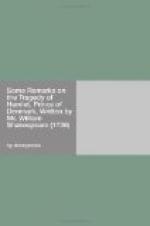I can by no Means agree with Mr. Theobalds, (p. 235.) who thinks, that it is necessary to suppose a considerable Number of Years spent in this Tragedy; because Prince Hamlet is said to desire to return to Wittenberg again, and is supposed to be just come from it; and that afterwards, the Grave-Digger lets us know that the Prince is Thirty Years old; my Reasons are, that as Wittenberg was an University, and Hamlet is represented as a Prince of great Accomplishments, it is no wonder that he should like to spend his Time there, in going on in his Improvements, rather than to remain inactive at Elsinoor, or be immers’d in Sottishness, with which he seems to tax his Countrymen; as will appear in the Sequel. Besides, he might well desire to return there, when he found his Throne usurped, and his Mother acting so abominable a Part. And as to the Term of going to School, &c. That does not at all imply literally a School for Boys, but is poetically used for Studying at any Age.
Another Reason may be given why there cannot be supposed to be a great Length of Time in this Play; which is this, That we see in the First Act, Ambassadors dispatch’d to old Norway, concerning his Nephew Fortinbras’s Army, which was then ready to march; and in the Fourth Act, we see this Prince at the Head of that Army, which immediately, upon the Embassy from the Danish King to his Uncle, we are naturally to suppose he leads to that other Enterprize which is mentioned in that Scene. Now it is no ways likely, that between the Embassy and the marching of an Army already assembled before that Embassy, there should be a Number of Years. These Reasons and the whole Conduct of the Piece convince me, that this is one of Shakespeare’s Plays, in which the least Time is employ’d; how much there is, I cannot pretend to say.
As to the Prolepsis, or in other Words, the mentioning the University of Wittenberg, long before its Establishment, thus antedating its Time, I shall not justify Shakespeare; I think it is a fault in him; but I cannot be of Opinion, that it has any bad Effect in this Tragedy. See Mr. Theobald’s Note, (p. 235.)
As to Hamlet’s Soliloquy, I shall set down the whole Passage, and shall subjoin the Remarks of a very eminent Author which are in the Spirit of true Criticism.
Oh that this too, too solid
Flesh would melt,
Thaw, and resolve it self into a Dew!
Or that the Everlasting had not fix’d
His Cannon ’gainst Self-slaughter! Oh
God! Oh God!
How weary, stale, and unprofitable,
Seem to me all the Uses of this World!
Fie on’t! Oh fie! ’tis an unweeded
Garden,
That grows to Seed; Things rank and gross
in Nature,
Possess it merely. That it should come to
this,
But two Months dead! Nay, not so much,
not Two!
So Excellent a King, that was to this,
Hyperion to a Satyr: So Loving to my Mother,




